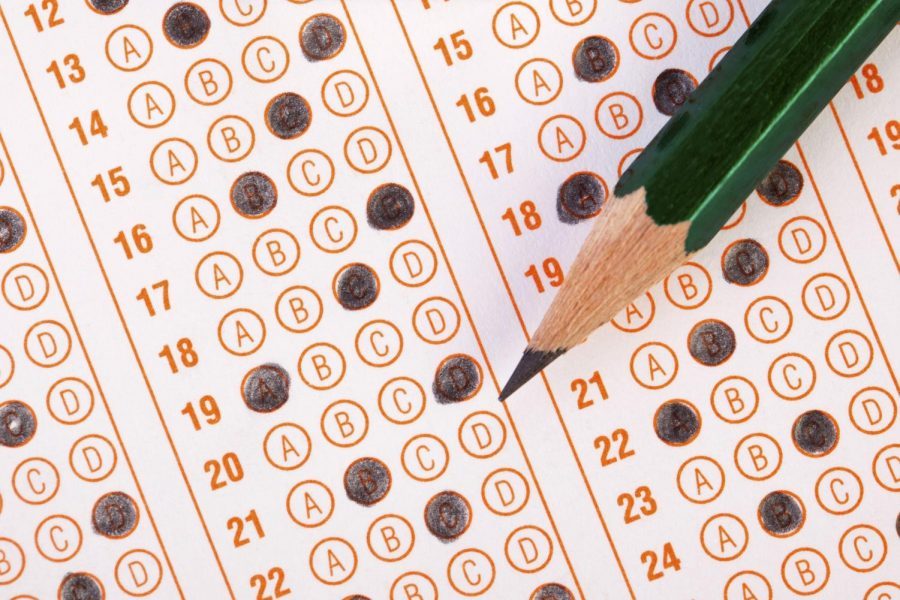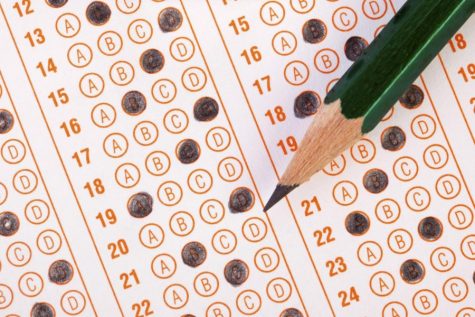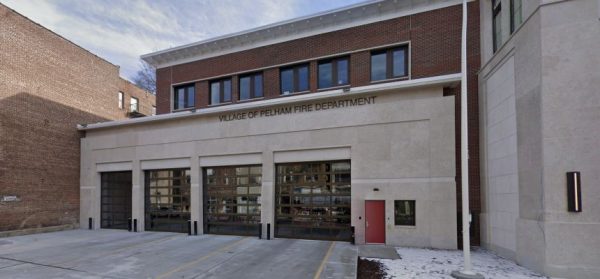An outdated tool, standardized testing hurts education
Albert Einstein once said, “Everybody is a genius. But if you judge a fish by its ability to climb a tree, it will live its whole life believing that it’s stupid.” Nowadays, the American education system needs to take a leaf out of Einstein’s book. Today, we’re using standardized testing as the metric for our teachers to educate our students. Standardized testing, which treats all students like numbers and fails to account for the specifics of circumstances. It is important to remember that standardized testing fails to actually teach or test content and costs massive amounts of money which could be allocated to more worthy educational causes, making it simply illogical to continue administering these tests.
The educational detriment of these standardized tests is fairly obvious. Think about it logically – if students are spending their time during the school days taking APs or ELA and Math state tests, where does that class time go? It can’t be made up. Teachers can’t be expected to continue teaching with 5 kids in their classes, or even if they do have a fair number of students they might be called to proctor an exam themselves. Having 3 or 4 extra days of instructional time might seem like a paltry amount of time compared to the 100+ days of classes students already have, but isn’t it better to just have the extra time in case it is needed? Especially considering that most classes will expect students to take some sort of culminating examination, as a student, I would much prefer having that time to actually learn and review the content being taught in that particular class.
In addition to the negative impacts that these standardized tests have on classrooms, it also takes money away from other worthy causes in education. For this we look to Dr. Steve Ferrara, who cites a Brookings Institute study showing that schools spent approximately 1.7 billion dollars per year on these standardized tests, seemingly a large amount of money, but actually only accounting for a quarter of a percent of the funding we spend on education.
Where Dr. Ferrara and I diverge on this issue is on how helpful this money might be if it’s used for other purposes. According to his calculations, that would represent approximately 550 dollars per teacher. He then goes on to argue that if we give each teacher a raise of that sum, it won’t dramatically affect the caliber of teacher or retain the better teachers. This argument is, quite frankly, ridiculous. A raise wouldn’t necessarily result in finding better teachers, but it would also be about providing our current teachers more money to actually be able to survive on. Our country already has a history of not paying teachers enough, so anything more, even a sum seeming as small as 550 dollars, will certainly not hurt.
Ferrara’s argument also fails to account for innumerable other uses of this money. Consider classrooms that are falling apart, students provided with old and outdated textbooks, and students who are in need of free or reduced price lunches. Having 550 per teacher could add up to significant money at a school level and could help provide for classroom or other school expenses. Once considering just what else this money could go to, it is obvious that the money spent on standardized tests which end up doing nothing but take away class time could be better spent on other necessities.
At the end of the day, while I might be ferociously opposed to taking my precalculus quiz this Thursday, I have to admit that it and day-to-day assessments like it are a valuable tool for teachers to assess their student’s knowledge. While those sorts of tests don’t act at a particular detriment to the students, standardized tests succeed in doing nothing helpful, and only end up taking away more and more class time which could have been used for actual education. They also cost large quantities of money which could be used for many different expenses that the school could incur. At the end of the day, standardized testing is an outdated tool to help American student’s learn. We need to take a lesson from Einstein, stop giving tests that test fish on their ability to climb trees, and use our money for better ends.
This article is part of a series on PMHS and Pelham Public Schools from a student perspective. Read the previous articles from this series here and here. Next week, the topic of the series will be the impending potential purchase of a house near Colonial School. As always, we appreciate any comments or arguments you have, so please comment either below or on our Facebook page.
Nick Lieggi is a freshman at Oxford College of Emory University and was a member of the PMHS class of 2020. He began his journalism career at the Pelham...













